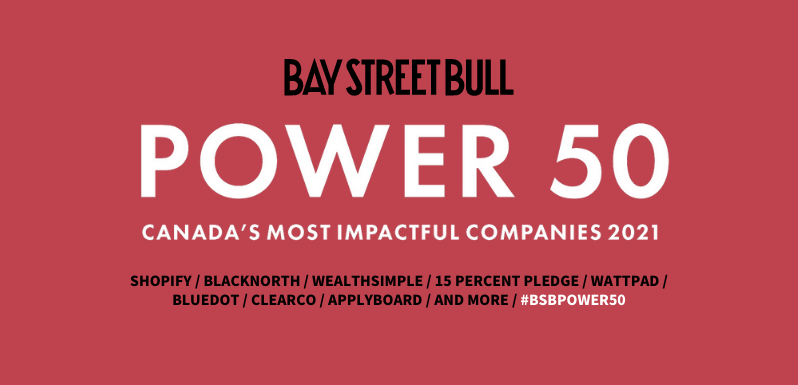While the rest of the world’s economy was thrown into disarray amidst a global pandemic, Ottawa-based technology and e-commerce company, Shopify, has flipped the script. In a year largely defined by a bleak economic landscape, the subscription-based software company reported revenues of $2.9 billion compared to $1.5 billion in 2019, reaching a remarkable 86 percent increase. And yet while Shopify’s success has been impressive, it isn’t entirely unprecedented. Several other major companies saw profits skyrocket through 2020, but while many have been justifiably critiqued for exploiting the year’s turbulence for maximum profit, standing on the backs of small businesses and their employees alike, Shopify has thrived with an inverse approach.
Through an exceptionally volatile economy, the Ottawa-based company has managed to achieve a symbiotic relationship with its small-business clients that is seldom seen, particularly in a time as unpredictable as this past year. By achieving astronomical growth while assisting Canada’s small businesses in adapting their commerce strategies for an increasingly online world, the company has drawn a blueprint of empowerment for businesses and corporations around the world. It’s a model that has allowed themselves to coexist as an industry leader alongside small businesses, accelerating their growth in the process and streamlining how consumers interact with sole proprietors.
When the severity of COVID-19 began to set in, business owners throughout Canada were forced to grapple with the notion of losing the foot traffic and steady business they’d grown accustomed to in brick-and-mortar stores. It was a daunting reality for the economy to face, particularly in a country such as Canada whose small businesses made up 97.9% of employer businesses as of 2018. Suddenly, those doors were locked, closed signs turned on, once-busy streets left abandoned, and business owners were left with two options: learn to adapt or close up shop. Enter Shopify.
Essentially, the company acts as an ecommerce platform that hosts a range of online stores from massive platforms such as Kylie Cosmetics to your local mom-and-pop shop, helping to organize the layout of the store’s appearance and delivering streamlined payment processing. Of course, creating a platform for small businesses that previously had no online presence didn’t guarantee clients comfortable passive income, but its intuitive interface, extensive customer reports, and array of management tools gave Canada’s small businesses the capacity to evolve through a period of economic uncertainty.


In many ways, Shopify offered a silver lining to small businesses still clinging to the familiarity of operating exclusively through brick-and-mortar retailing, ultimately accelerating the adoption of digital technology. A survey conducted by Cisco Systems and International Data Corporation last summer showed that over 70 percent of small businesses globally noted that “COVID-19 has been a key driver for fast-tracking [the] digitization journey.” This digitalization not only assists small businesses, but drives entrepreneurship and, in turn, fosters economic growth and job creation.
Therein lies the beauty of Shopify’s relationship with Canada’s small businesses; Shopify has committed to empowering entrepreneurship at every level, but it’s also created a blueprint where Canada’s largest tech company can empower and coexist alongside small businesses in what has become a rare mutually beneficial relationship. In a period that saw the worst global recession since the Great Depression, Shopify managed to generate an astronomical $18.3 billion in business activity supported by its merchants in Canada alone—equivalent to creating 123,574 jobs—most of which were designated as small businesses. Some were existing businesses learning to adapt and serve their customers through new restraints, but others were start-ups that saw potential and demand amidst the chaos of the pandemic. Shopify supported both groups, offering comprehensive digital business services at relatively low cost and enabling them to enter and compete in the global market.
In return for their services, Shopify became Canada’s largest company by market capitalization and is poised to continue its post-pandemic growth, with the company investing in a variety of revolutionary new software programs such as the Shopify Fulfillment Network, the Shop App, and Shopify Plus, all of which seek to add more freedom to shop owners and convenience to consumers. But the company’s new features aren’t simply incorporated to maximize their clients’ sales. Instead, Shopify’s recent focus has turned towards building equity by empowering Black and Indigenous-owned Canadian businesses. Through partnerships with Indigenous organizations to reduce barriers to entrepreneurship within the community and highlighting Black businesses through their mobile shopping assistant app, Shop, Shopify has created a path to success for marginalized communities during an exceptionally challenging period. And although all of Canada’s small businesses are undoubtedly rejoicing the recent return to normalcy, a strong digital presence and programs offered by the company still bode well for the years to come.


Before the pandemic, many business owners simply put off the task of setting up their online platforms because there was no immediate demand. Brick-and-mortar shops offered foot traffic and a stream of knowledgeable customers that provided steady income, but when Shopify presented an online substitute, it also delivered new avenues of growth for small businesses to explore.
“It’s less expensive and more affordable to build an online store than to set up a physical store where you need rent, you need leasehold improvements, you need inventory, you need payroll to pay staff. It’s easier to get up and running, and it’s more affordable in a pure online context,” explains Shopify’s president, Harley Finkelstein. “When you add technology […] and you add companies like Shopify […], the cost of failure gets really, really low, which means that you can try something and, if it works, you scale it. If it doesn’t, you can try something else.”
For Shopify, the guiding force has always been empowerment, whether that’s empowering their own growth and innovation, the expansion of Canadian small businesses, or the equity of entrepreneurs from marginalized communities.
As president, Finkelstein is charged with theorizing and executing new ways of empowering businesses throughout the world, but even so, he understands the exceptional weight the company carries in the country in which it was founded.
“A company that was started out of Ottawa, Canada can actually create a movement of entrepreneurship around the world, can actually level the playing field for small businesses in a way that just was impossible even a couple of years ago,” he remarks. “We can now help inspire more companies that not only build great businesses, that not only help hire great people, that the shareholders are happy with, the merchants and customers are happy, but they actually can have a long-lasting global impact.”


Within that mission lies a unifying vision for the future. As the leader of a company that recently surpassed the $2 billion mark in funding to entrepreneurs through Shopify Capital, Finkelstein understands that Shopify’s continued success—and the success of the global economy at large—replies upon the empowerment of all businesses, not just the top one percent.
“If we give entrepreneurs and people that have ambition the tools that traditionally were inaccessible to them, and not affordable to them, what would happen?” he asks. “Can we create more independence? Can we create more of these great companies and these great entrepreneurs? Then can they help others and create that sort of entrepreneurial flywheel? So that levelling of the playing field, that idea of Shopify’s objective is not only to get more of the pie in terms of the total addressable market but grow the market itself and create more people, more entrepreneurs, I think that is a really great thing.”
In a time when consumers are justifiably sceptical of which businesses they choose to support and invest in, Shopify is reassuring Canadians as an ecommerce giant authentically invested in the viability of its small businesses. From helping to guide entrepreneurs into the new age of digital marketing to ensuring marginalized communities are given the same opportunities to succeed moving forward, Shopify has drawn the blueprint for creating impactful relationships between industry leaders and small businesses. It’s a philosophy reflected by its founders and the country in which it was founded: that empowerment is the vital stepping-stone toward innovation, equality, and continued growth.












